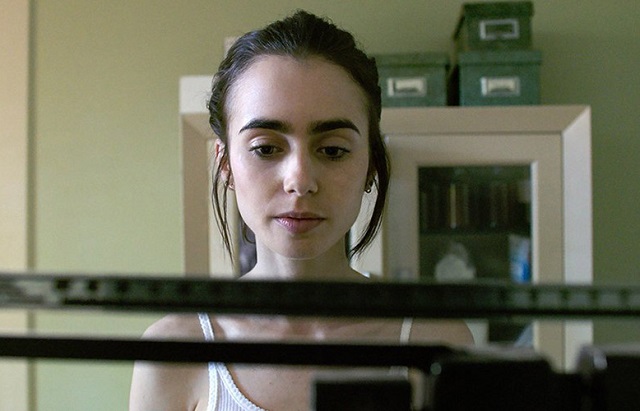
The first time I passed out, I was 13 years old.
I got up in the middle of the night to use the bathroom, but as soon as I entered the hall, it was clear to me I would not make it. The dim walkway swam in front of my eyes.
I lost balance and toppled over.
I slammed into my little sister’s door, which was ajar and flew open with a bang. Only eight years old, she sat up in bed and started crying. My mother emerged from her room in a drowsy maternal mania.
The world was still nauseating and unsteady to me as I lay there trying to form my thoughts into words and my words into a sentence that would explain why I had crashed to the ground.
I had a self-induced problem: I was starving myself.
My mother would speak on the phone with her friends about my fainting spells, about the way my school lunch tab was always zero, about the way I never had time to eat breakfast.
“So you think that’s normal for girls her age? You really think she will just grow out of it?”
She would hasten to close the door when I walked past.
To her relief, I did grow out of it. I became involved in running track, and I became proud of the things my body could achieve—not just what it looked like. I wanted to be faster, so I needed fuel.
Soon, the habit of starvation was admonished, yet my habits of the mind, which were the root of the problem, did not disappear. They were only pruned back. The physical problem had been solved, but not the mental or emotional.
I wanted to be “perfect.” Many women do. As our male counterparts often focus on achievements for their self-worth, women tend to focus on perfection. When applied to the body, this takes a toll.
Nothing in nature is perfect. No two tomatoes on the vine are identical. My kitten has a crooked tail; his brother’s tail is longer and pin straight. My sister is three inches taller than me. The rainbow of genetic variation is responsible for the continuation of life on Earth. It’s an ancient and beautiful truth.
But at 13 years old, I could only think of regimenting my body in an attempt to destroy what nature had intended.
Now that I am older, I am still concerned with my body image. I eat a vegetarian diet, and I work out whenever I have free time. Recently, through my yoga and meditation practice, I’ve been able to examine how these seemingly healthy habits may be different manifestations of my teenage tendencies.
Physical activity and healthy eating make me feel strong and energetic—but when I do not have time to make it to the gym or to prepare a plant-based meal, I feel the same familiar guilt that riddled me as an adolescent.
Yoga and meditation have given me the opportunity to look within, and not to the external, to diagnose my unhealthy obsessions with my size and shape. When I investigate where this body-centric guilt and judgement comes from, in the recesses of my own psyche, I recognize that they are partially motivated by my ingrained desire for perfection.
Being aware of this does not make me want to stop eating well and exercising, but it does make me want to correct the deeper problem: learning to love myself.
When I first started attending yoga classes and wearing my tight stretchy yoga clothes, I found myself pulling and tugging at them. I was still concerned that I was too soft, that I took up too much space. I wanted to diminish myself.
I looked at the other yogis around me who might be “better” at the asanas, or have “better” body shapes. I was there for exercise, but as yoga began to work its magic on me—not just physically, but spiritually and mentally—I found myself noticing these thoughts and intentionally asking myself, “How will this serve me? Am I contributing to my peace and happiness, or eroding my peace and happiness?”
Meditation and yoga are an excellent tool for understanding patterns of thought, both positive and negative. And I will probably always have some negative thoughts about the way I eat and look for the rest of the life. What I am working on is the way I handle them.
When I meditate, I can see my thoughts float by me and then decide if they are worth entertaining. Whenever a negative thought about my body approaches, I try to let it slide by in the same way. Sometimes I fail, and sometimes I don’t.
But I have noticed that these thoughts haunt me less and less when I rely on two all-encompassing medicines: time and patience.
When I am practicing yoga, my mind’s habit of comparing my body to others’ has another chance to torture me. As I get into my space of self-reflection, by looking within and focusing on my breath, I can guide these thoughts away. It’s like strengthening a muscle. Soon, I began not only pushing them away in yoga class, but in other parts of my day. When I see one of those “Perfect Instagram Girls” on my social media for example, my new mental muscle flexes again.
The thoughts will always come, but I no longer let any thought penetrate my view of who I am unbeknownst to me. It can be hard, and I slip up, but reminding myself of this truth grounds me.
My weight has never been the problem. My eating habits have never been the problem. The problem has always been the way I see myself.
We are each organic, beautiful, variant beings. Some of us have large breasts, large hips, large thighs. Others may want these things and never have them.
But I am slowly learning to choose self-love whenever the chance arises through mindful reflection. When I practice, I feel grateful for my body—my soft tummy and curvy bottom—all of it.
Because my body can do this practice, because it can make me feel connected to the cosmic forces of truth and love and joy through simple movements and breath, it is teaching me to love it more fully, which is a clever sort of irony.
It’s time we stop making our bodies the enemy, and instead let them teach us. Because our bodies are wiser than any insecurity we have allowed to persist.
~
~
~
Author: Chloe Smith
Image: YouTube screenshot
Editor: Nicole Cameron
Copy Editor: Catherine Monkman
Social Editor: Sara Karpanen







Read 0 comments and reply